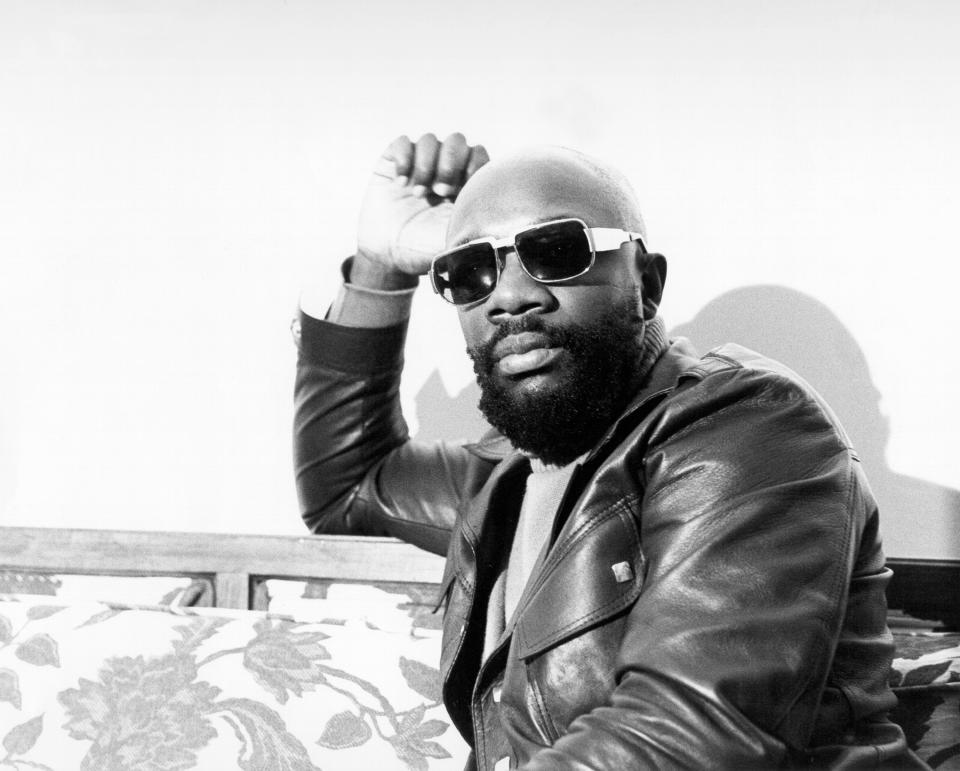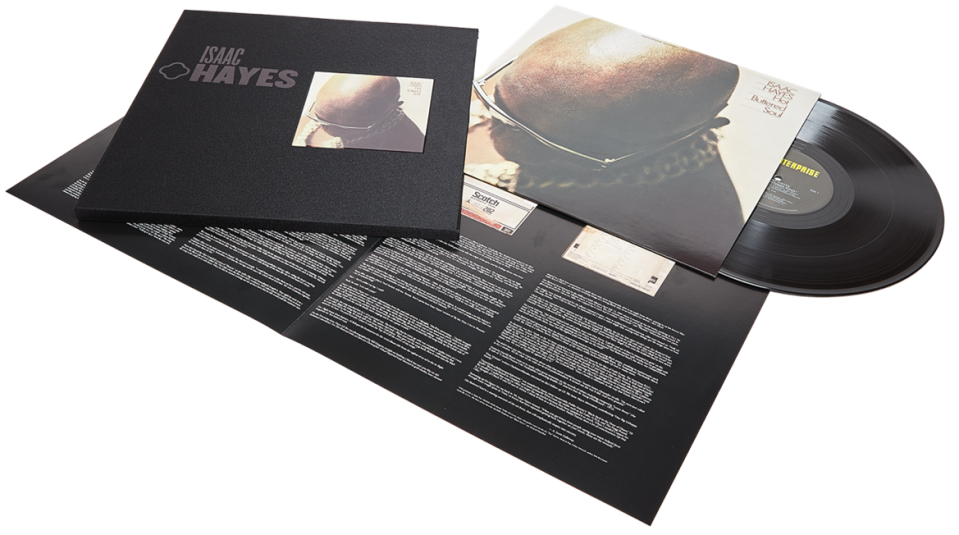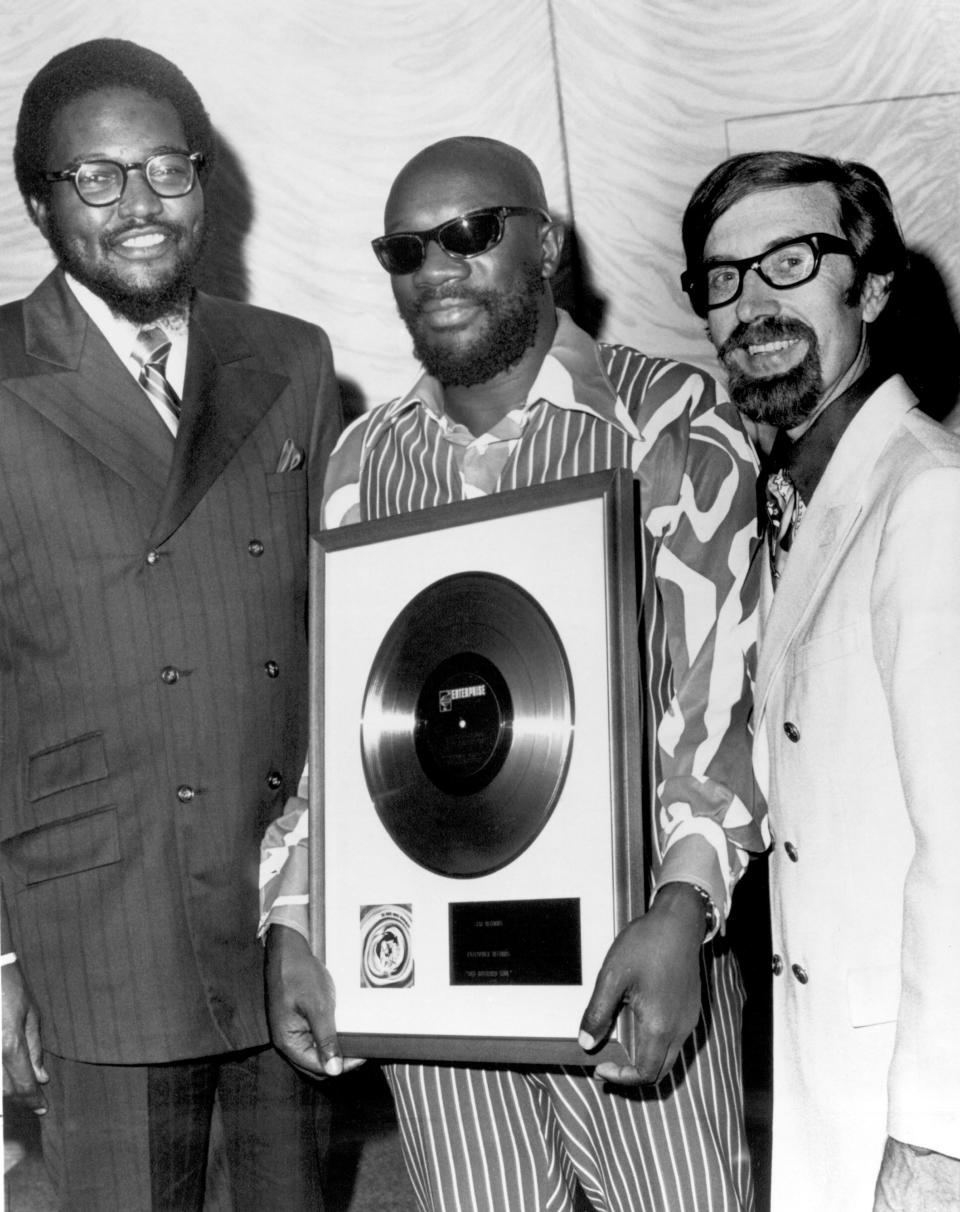Legacy of Isaac Hayes' 1969 'Hot Buttered Soul' revived in remastered album
- Oops!Something went wrong.Please try again later.
- Oops!Something went wrong.Please try again later.
More than five decades after its groundbreaking, gold-selling release, Craft Recordings has released an audiophile-friendly pressing of "Hot Buttered Soul," Isaac Hayes' genre-redefining 1969 soul album initially released via Stax Records.
Though Hayes himself passed away in 2008, it's in conversations for The Tennessean with Bar-Kays bassist James Alexander (who played on the original release) and legendary mastering engineer Bernie Grundman (who re-mastered the project for Craft Recordings) that the power of Hayes' innovation — and the influence of his art's legacy — are celebrated.
The era and one of its ultimate recordings

"Hot Buttered Soul" was recorded a year after the Rev. Martin Luther King Jr. was brutally murdered at Memphis' Lorraine Motel, 5 minutes away from Stax's recording studios.
More than 750 miles from Memphis, Detroit's Motown was a decade into refining "The Sound of Young America." Thus, in the wake of devastatingly dynamic changes in movements toward Black liberation, Hayes could busy himself on a sophomore album aimed at discovering "The Sound of Black Freedom."
Hayes' debut a year prior was comprised largely of improvisational jazz and was a deviation from his mostly behind-the-scenes work as David Porter's songwriting partner — which yielded hits like "Hold On, I'm Comin'" and "Soul Man" for Sam & Dave.
Unrehearsed improvisation dominates his sophomore album, too.
The result is 45 minutes of music languorously delivered in four tracks cut in just over eight hours.
The music that was crafted ultimately portended the future of America's popular music and culture. Thus, it required the intentional disambiguation of instrumentation from lyrics to allow both to exist as spiritual forms expanding in the nation's dark social void.
Empathetic sermons emerged for a society healing from being victimized by circumstances well within their control.
The songs themselves

"Rhinestone Cowboy" performer Glen Campbell's chart-topping success with "By the Time I Get to Phoenix" is cut by Hayes as a track seven-times longer. The song evolves from being what the song's writer, Jimmy Webb, calls a "fantastical" torch song that exists "in a twilight zone of reality" into an astonishing, and blue-collar Black-defined anthem about thoughts slipping through the dark synapses of the human mind.
Similarly, Dionne Warwick's "Walk on By" becomes a Hayes ballad extended four times its original length.
Burt Bacharach and Hal David's work grows from pristine orchestral soul into a moody funk anthem that explores the moment that antagonism melts into heartbreak as love grows from a dream deferred to passion lost forever.
"Hyperbolicsyllabicsesquedalymistic" and "One Woman" buffer the release with fantastical tales of hyper-addictive romance and a Memphis-area favored soul track cut one month prior by Al Green.
Realities redefined
To The Tennessean, Alexander removes all artifice from the recording of "Hot Buttered Soul." His comments are consistent with describing young Black men playing instruments and crafting art guided by the healing that psychedelic and transformative art can provide a wounded spirit.
Fresh from having simultaneously released 27 albums and 30 singles to financially revive the label, which lost its entire back catalog after splitting with Atlantic Records in May 1968, Stax executive Al Bell encouraged Stax's creative staff, including Hayes and guitarist Steve Cropper, to continue to pursue recording careers.
Bell's aggressive commercialism, coupled with social upheaval, fostered an environment wherein esoteric idealism became commonplace.
"On 'By the Time I Get to Phoenix,' (drummer) Willie Hall and I each played one note for nine minutes," Alexander says. "How ... boring is that? But, when Isaac dropped into singing, it made sense — it was as if he was offering a sigh of relief.
"We were living in times where we could only hope for the best while attempting to (redefine our realities)."
'Empowerment that refuses to be contained'
Bernie Grundman is the legendary mastering engineer responsible for allowing peerless sonics to create a progressive musical through-line from Steely Dan's jazz-rock to Michael Jackson's pop kingdom, Dr. Dre's funk-laden street rap symphonies, narrowed the gap between Big Boi's "Speakerboxxx" and Andre 3000's "The Love Below" and much more.
More music: Garth Brooks, Trisha Yearwood welcome Nashville to the 'Oasis' at grand opening for 'Friends In Low Places'
Mastering is a delicate process that ultimately includes balancing the sonic elements of a stereo mix and optimizing playback by enhancing the overall sound of how songs are initially mixed.
Grundman describes "Hot Buttered Soul" as being filled with "powerfully dramatic (sonic) dynamics filled with rich, impressive grandeur."
To Grundman, the album, though only four tracks, is defined by "emotional, lyrical and orchestral stories" that, for mastering purposes, impressively balance sweeping orchestration, reverb-heavy mixing and leakage on the vocal microphone
For Craft Recordings, he carved out more space for Hayes' baritone.
Given that a baritone sound already falls low within an already sonically diverse mix filled with multiple layers of atmospherics and orchestration, Grundman leaned into his early days as a bebop and jazz fanatic to find the rhythmic qualities of Hayes' voice as an instrument unto itself.
Observing Hayes' voice — as well as the Bar-Kays as players — in such a manner allows Grundman to arrive at a fascinating point about the impact of that era's creativity.
"The natural freedom in those rhythms attracts empowerment that refuses to be contained," he says.
A 'fearless' album's legacy
"Young, fearless people unwilling to make calculated, planned recordings or second guess themselves gathered to make an album," says Alexander about "Hot Buttered Soul."
In the years following the album's release, what Hayes described to The New York Times in 1972 as "authentic and expansive soul music" offered immediately legacy-defining inspiration for many other acts.
Marvin Gaye released "What's Going On" in 1971, and between 1974 and 1977, a trio of Stevie Wonder's albums — "Innervisions," "Fulfillingness' First Finale" and "Songs in the Key of Life" — were Grammy winners for Album of the Year.
The decade of the 1970s closed with Parliament's trio of Afrofuturistic top-five hits "Give Up the Funk (Tear the Roof off the Sucker)," "Flash Light" and "Aqua Boogie (A Psychoalphadiscobetabioaquadoloop)." Earth, Wind and Fire was also Grammy-nominated for a funk and jazz-inspired cover of the Beatles' "Got to Get You into My Life" and mega-ballad "After the Love Has Gone."
Alexander continues by recalling a conversation with jazz artist Marcus Miller in which he noted that Hayes' ability not just to cover songs on "Hot Buttered Soul" — but rather to spiritually inhabit and recast them as his narratives — inspired Luther Vandross to include covers of songs like Warwick's "A House Is Not a Home" and "So Amazing," Marvin Gaye and Tammi Terrell's "If This World Were Mine" and Brenda Russell's "If Only for One Night."
Following "Hot Buttered Soul," Hayes won an Academy Award for Best Original Song for the theme to the 1971-released blaxploitation film "Shaft," plus released six No. 1 R&B chart albums and 11 consecutive top-40 singles between 1969 and 1974.

However, by 1974, Stax Records had severe financial problems due to poor record sales stemming from limited distribution by new partner CBS Records. As a Stax employee, Hayes was, like the label, deep in debt to Memphis' Union Planters Bank. Due to issues with the bank and label, Hayes sued Stax for $5.3 million. As a resolution, Stax released Hayes from his recording and production contracts. Union Planters would collect all of Hayes's income and apply it toward his debts.
Eighteen months later, Hayes was forced into bankruptcy in 1976. A year later, he had lost his home and much of his personal property, plus the rights to all future royalties earned from the music he had written, performed, and produced.
Past 1986, Hayes never charted a top-10 pop or soul single in the United States.
Legendary bassist Alexander summarizes "Hot Buttered Soul"'s legacy with a simple yet profound sentence.
"(Notions that became) indescribably timeless motivations allowed a great band to go jam and let an engineer let the tape roll."
This article originally appeared on Nashville Tennessean: Isaac Hayes' genre-redefining album 'Hot Buttered Soul' re-released

